
Jeanne Eagels was an American stage and film actress. Eagels appeared in many Broadway productions, and in the emerging medium of sound films. She was posthumously nominated for the Academy Award for Best Actress for her 1929 role in The Letter after dying suddenly that year at the age of 39.
This is an overview of 1929 in film, including significant events, a list of films released and notable births and deaths.

John Gilbert was an American actor, screenwriter and director. He rose to fame during the silent era and became a popular leading man known as "The Great Lover". His breakthrough came in 1925 with his starring roles in The Merry Widow and The Big Parade. At the height of his career, Gilbert rivaled Rudolph Valentino as a box office draw.

Anne Bancroft was an American actress and director. Respected for her acting prowess and versatility, Bancroft received an Academy Award, three BAFTA Awards, two Golden Globe Awards, two Tony Awards, two Primetime Emmy Awards, and a Cannes Film Festival Award. She is one of only 24 thespians to achieve the Triple Crown of Acting.

Humorous Phases of Funny Faces is a 1906 short silent animated cartoon directed by James Stuart Blackton and generally regarded by film historians as the first animated film recorded on standard picture film.

Edwin Eugene Lockhart was a Canadian-American character actor, playwright, singer and lyricist. He appeared in over 300 films, and received an Academy Award nomination for Best Supporting Actor for his role as Regis in Algiers (1938), the American remake of Pepe le Moko.
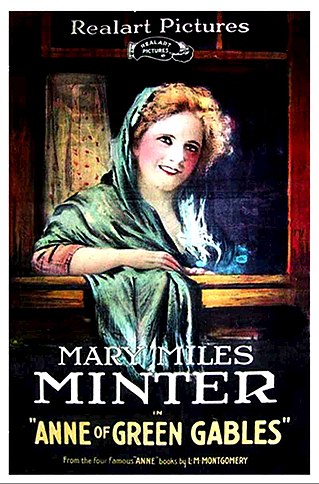
Anne of Green Gables is a 1919 American silent comedy-drama film directed by William Desmond Taylor. The film was based upon the 1908 novel of the same name by Lucy Maud Montgomery. By 1999, all prints of the film were believed to have been lost.
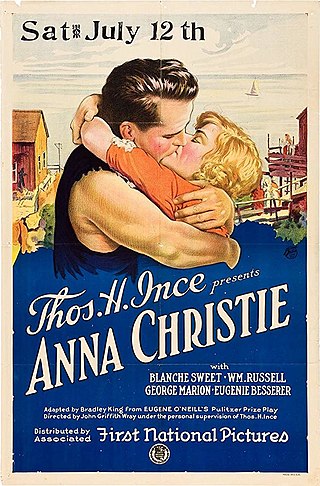
Anna Christie is a 1923 American silent drama film based on the 1921 play by Eugene O'Neill and starring Blanche Sweet and William Russell.
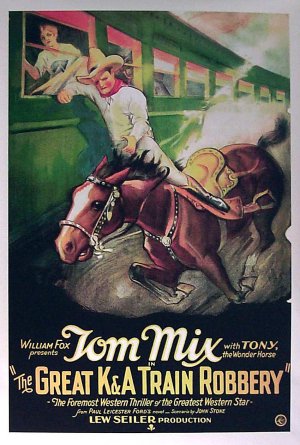
The Great K & A Train Robbery is a 1926 American silent Western film directed by Lewis Seiler and starring Tom Mix and Dorothy Dwan. The film is based on the actual foiling of a train robbery by Dick Gordon as related by Paul Leicester Ford in his book The Great K & A Train Robbery originally published as a serial in Lippincott's Monthly Magazine in 1896.

Jeanne Eagels is a 1957 American biographical film loosely based on the life of stage star Jeanne Eagels. Distributed by Columbia Pictures, the film was produced and directed by George Sidney from a screenplay by John Fante, Daniel Fuchs and Sonya Levien, based on a story by Fuchs.

America, also called Love and Sacrifice, is a 1924 American silent historical war romance film. It describes the heroic story of the events during the American Revolutionary War, in which filmmaker D. W. Griffith created a film adaptation of Robert W. Chambers' 1905 novel The Reckoning. The plot mainly centers itself on the Northern theatre of the war in New York, with romance spliced into the individual movie scenes.

A Kiss for Cinderella is a 1925 American silent fantasy film taken from the 1916 stage play by James M. Barrie. The film stars Betty Bronson and Tom Moore and was made at Paramount's Astoria Studios in Astoria, Queens. The play had starred stage actress Maude Adams in the Bronson role.

Hotel Imperial is a 1927 American silent war drama film directed by Mauritz Stiller and released by Paramount Pictures. The film is set in Austria-Hungary during World War I and starring Pola Negri as a hotel chambermaid. It is based on the 1917 Hungarian play of the same name by Lajos Bíró.

Are Parents People? is a 1925 American silent comedy film starring Betty Bronson, Florence Vidor, Adolphe Menjou, George Beranger, and Lawrence Gray. The film was directed by Malcolm St. Clair and released by Paramount Pictures.
John Colton was an American playwright and screenwriter born in Minneapolis, Minnesota. He spent the first 14 years of his life in Japan where his English father was a diplomat. After returning to the US he soon worked for a Minneapolis newspaper.
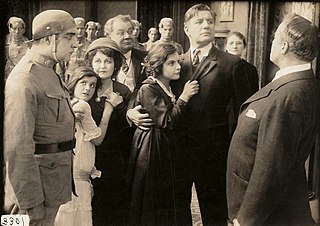
The Battle Cry of Peace is a 1915 American silent war film directed by Wilfrid North and J. Stuart Blackton, one of the founders of Vitagraph Company of America who also wrote the scenario. The film is based on the book Defenseless America, by Hudson Maxim, and was distributed by V-L-S-E, Incorporated. The film stars Charles Richman, L. Rogers Lytton, and James W. Morrison.

Lombardi, Ltd. is a surviving 1919 American silent feature comedy film. It was adapted by June Mathis from a 1917 play of the same name by Frederick and Fanny Hatton, and directed by Jack Conway. Warner Baxter had an early uncredited minor role in the film.
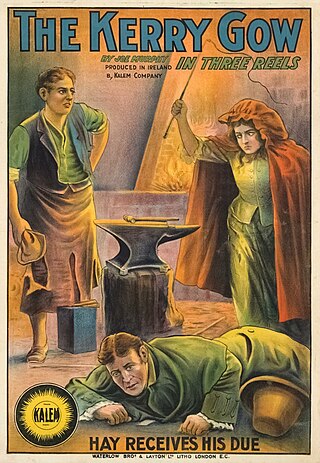
The Kerry Gow is a 1912 American silent film produced by Kalem Company and distributed by General Film Company. It was directed by Sidney Olcott with Alice Hollister and Jack J. Clark in the leading roles.

RichardRobert Elliott was an American character actor who appeared in 102 Hollywood films and television shows from 1916 to 1951.

The Home Towners is a 1928 American comedy film directed by Bryan Foy and starring Richard Bennett, Doris Kenyon, and Robert McWade. This film was the third all talking picture produced by Warner Brothers to be released.


















